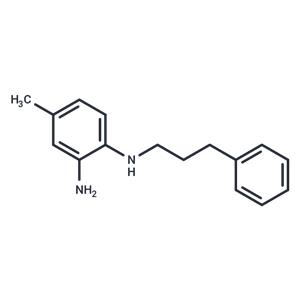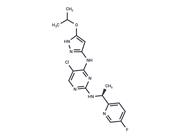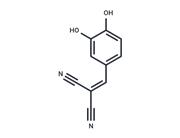| Name | JSH-23 |
| Description | JSH-23 is an NF-κB inhibitor that inhibits NF-κB transcriptional activity (IC50=7.1 μM) but does not affect IκBα degradation. JSH-23 is an antioxidant with anti-inflammatory activity. |
| Cell Research | Macrophages RAW 264.7 are incubated with various concentrations of JSH-23 compound for 24 h. The cells are treated with WST-1 solution and absorbance is measured at 450 nm.(Only for Reference) |
| Kinase Assay | Measurement of NF-κB transcriptional activity: Macrophages RAW 264.7 transfected stably with reporter plasmid of pNF-κB-SEAP-NPT are treated with 1 μg/ml LPS and/or sample for 16 hours. As the reporter, SEAP activity in the cell-free culture media is measured as followed. Single cell-derived stable transfectants are plated in 5 ml of T-25 flask, and the media is decanted 24 h later. At this time, cells are washed twice with phosphate-buffered saline, and incubations are initiated by addition of new media. Chemicals are added to the culture medium after 24 h of incubations. Aliquots (25 ml) of medium from a control or chemical-treated cultures are taken at 0, 3, 20, 24, 48, and 72 h, heated at 65°C for 5 min to eliminate the alkaline phosphatase activity, and used immediately or stored at -20°C. Mixtures consisting of dilution buffer (25 ml), assay buffer (97 ml), culture media (25 ml), and 4-methylumbelliferyl phosphate (MUP, 1 mM, 3 ml) in each well of the 96-well plates are incubated for 60 min in the dark at room temperature. Fluorescence emits the product of the SEAP/MUP is measured at 449 nm using a 96-well plate fluorometer after excitation at 360 nm. |
| In vitro | METHODS: Bone marrow macrophage BMMs were treated with JSH-23 (0.78-200 µM) for 48-96 h. Cell viability was measured by CCK-8 assay.
RESULTS: JSH-23 had no detectable toxic effects at concentrations below 50 µM. [1]
METHODS: Macrophages RAW 264.7 harboring the reporter gene pNF-κB-SEAP-NPT were treated with LPS (1 µg/mL) and JSH-23 (1-30 µM) for 16 days, and SEAP expression was assayed to reflect NF-κB transcriptional activity.
RESULTS: JSH-23 inhibited LPS-induced SEAP expression in a dose-dependent manner by 23±3% at 3 µM, 68±3% at 10 µM, and 103±4% at 30 µM. JSH-23 inhibited NF-κB transcriptional activity. [2] |
| In vivo | METHODS: To investigate the role in diabetic neuropathy, JSH-23 (1-3 mg/kg) was administered orally to streptozotocin-induced diabetic rats once daily for two weeks.
RESULTS: JSH-23 treatment significantly reversed nerve conduction and nerve blood flow deficits in diabetic animals. The treatment also partially corrected the reduced mechanical pain threshold.JSH-23 treatment inhibited nuclear translocation of the p65/p50 subunit in the sciatic nerve. [3] |
| Storage | store at low temperature | Powder: -20°C for 3 years | In solvent: -80°C for 1 year | Shipping with blue ice. |
| Solubility Information | DMSO : 50 mg/mL (208.04 mM)
H2O : < 1 mg/mL (insoluble or slightly soluble)
Ethanol : 16 mg/mL (66.6 mM)
|
| Keywords | JSH-23 | Nuclear factor-κB | Nuclear factor-kappaB | NF-κB | Inhibitor | JSH 23 | JSH23 | inhibit |
| Inhibitors Related | Sodium Houttuyfonate | Zingerone | Lidocaine | Diethylmaleate | Glucosamine | sodium lauroyl-α-hydroxyethyl sulfonate | Lidocaine hydrochloride | 5-Aminosalicylic Acid | Indole-3-carbinol | Diallyl disulfide | Caffeic Acid Phenethyl Ester | Sodium salicylate |
| Related Compound Libraries | Ferroptosis Compound Library | NF-κB Signaling Compound Library | Bioactive Compound Library | Anti-Ovarian Cancer Compound Library | Anti-Breast Cancer Compound Library | Inhibitor Library | Anti-Prostate Cancer Compound Library | Anti-Aging Compound Library | Bioactive Compounds Library Max | Anti-Liver Cancer Compound Library |

 United States
United States



